七年级Unit_2What_time_do_you_go_to_school测试题
七年级英语下册_Unit2_what_time_do_you_go_to_school知识点__练习和答案
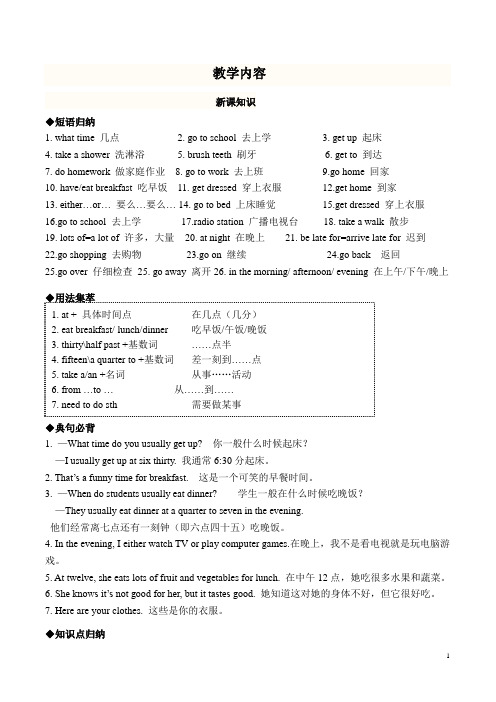
教学内容新课知识◆短语归纳1. what time 几点2. go to school 去上学3. get up 起床4. take a shower 洗淋浴5. brush teeth 刷牙6. get to 到达7. do homework 做家庭作业8. go to work 去上班9.go home 回家10. have/eat breakfast 吃早饭11. get dressed 穿上衣服12.get home 到家13. either…or… 要么…要么… 14. go to bed 上床睡觉15.get dressed 穿上衣服16.go to school 去上学17.radio station 广播电视台18. take a walk 散步19. lots of=a lot of 许多,大量20. at night 在晚上21. be late for=arrive late for 迟到22.go shopping 去购物23.go on 继续24.go back 返回25.go over 仔细检查25. go away 离开26. in the morning/ afternoon/ evening 在上午/下午/晚上◆用法集萃1. at + 具体时间点在几点(几分)2. eat breakfast/ lunch/dinner 吃早饭/午饭/晚饭3. thirty\half past +基数词……点半4. fifteen\a quarter to +基数词差一刻到……点5. take a/an +名词从事……活动6. from …to … 从……到……7. need to do sth 需要做某事◆典句必背1. —What time do you usually get up? 你一般什么时候起床?—I usually get up at six thirty. 我通常6:30分起床。
新人教版七年级下册unit2what-time-do-you-go-to-school教案语法知识点

Unit2 What time do you go to school?Section A1a:1.时间的表达方式✓采用数词表达时间例如:10:30 ten thirty 11:50 el even fifty 16: 18 four eighteen p.m.✓采用介词past, to表达时间30分钟以前的可以说成几点过几分用past30分钟以后的可以说成差几分几点用to1)half past + 点钟……点半9:30half past nine2)分钟+past+点钟几点过几分10:05 十点过五分3)分钟+to+点钟差几分几点9:58(差两分十点) two (minutes)to ten 注意:quarter 一刻钟 a quarter past nine 9:15 a quarter to nine 8:45 2.几种有关时间的问句✓What day is it today? It is + 星期✓What is the date today? It is + 日期✓What time is it?= what’s the time? 回答:it is ……3.time 的用法总结:in time 及时on time 按时at times 有时at the same time 同时all the time 总是each time 每次next time 下次It is time for……=It is time(for sb)to do……到做某事的时间了It is time for school. = It is time to go to school.4.本单元重点句型What time do/does+主语+ ususlly+……?主语+usually+动词+其他+at+时间。
What time d o you usually get up, Rick?I usually get up at six thirty.What time d oes she/he usually go to school?He/ She usually goes to school at a quarter to nine.5.1a短语讲解①get, gets get up 起床get dressed 穿衣服②go, goes go to school 去上学go to work 去上班go to bed 去睡觉go home 回家③brush teeth(tooth 单数)④eat breakfast/lunch/dinner = have breakfast/lunch/dinner 吃……have a class/lesson上课have an art class/lesson 上美术课have a soccer game have a party⑤take a shower=have a shower⑥be dressed in穿着……My father is dressed in a white shirt.dress sb给某人穿衣服My mother asks me to dress my sisterdress oneself某人自己穿衣服The girl can dress herself.oneself 指反身代词包括myself,yourself,herself,himself,itself,ourselves yourselves,themselves2d6.比较两个“工作”:①job 为可数名词,表示具体的职业,只能做名词.I’m a teacher. I have a good job.②work为不可数名词,指日常生活工作中从事的体力活脑力劳动;work还可做动词.He has a lot of work to do today.7.in, on, at,for辨析1)in the morning/afternoon/evening=at nightin spring/summer/autumn/winterin this month/season/year in 1995/20162) on 常与日期/星期搭配,表示在“具体的某一天”on October second/2nd在十月十二日on Monday 在星期一3)介词at 常与具体的几点几分连用at 9:00 in the morningat a/ the station at a radio station 在广播站at home , at school4)for 后边加一段时间for two hours for ten minutesI have a class for 45minutes at school. What about you?We have sports for about(大约) one hour at school today.今天我们在学校做了大约一小时的运动。
英语七年级下册语法Unit2What-time-do-you-go-to-school

Unit 2 What time do you go to school ? 一.What time 什么时候,几点钟。
常用于对具体的(确切的)时间提问,也可用when来替换,但反之不一定行。
1. What time/ When do you get up in the morning?I get up at six o’clock in the morning.2. What time is it ? / What’s the time ?It’s six-thirty. / It’s half past six.二.★关于时间的表达法:顺读法,逆读法。
1. 顺读法:按汉语的习惯,先说点后说分的方法。
结构:点+分。
5:10 five-ten 8:30 eight-thirty9:46 nine forty-six 1:05 one-five整点的读法:基数词+o’clock7:00 seven o’clock 12:00 twelve o’clock2. 逆读法:借助介词past或to, 先说分后说点的方法,其结构为:分+past/to +点past 过to 差①当分钟数小于或等于30分钟时,用介词past表示。
7:05 five past seven 6:30 thirty past six =half past six30 thirty=half an hour 11:25②当分钟数大于30时,用介词to表示:几点差几分。
其结构为:(60-分)+to +(点+1)11:50 ten to twelve 9:45 fifteen to ten =a quarter to ten7:55 3:35hour 小时minute 分second 秒quarter 一刻钟写出同义句:seven thirty = ____ ____ seven eight forty = ____ ______ nine 三.★感叹句What a funny time to eat breakfast !What a lucky guy!定义:表示喜怒哀乐等强烈感情的句子叫感叹句。
七下Unit_2_What_time_do_you_go_to_school
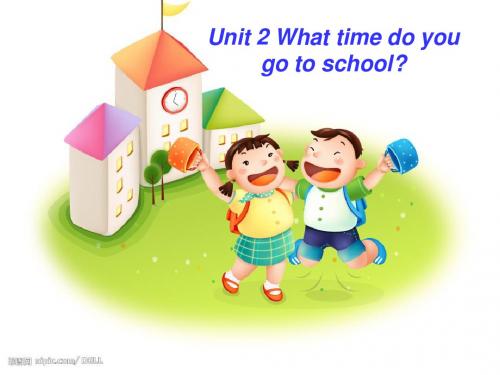
3a
Write answers or questions. Use always, usually or never.
1.What time do you get up on school days?
I usually get up at 5:30 on school days. _______________________________
6:30
2a
Listen to the conversation and complete the sentences.
two two Jim has _____brothers and ____sisters. Jim’s only shower. family has ________ one
What time is it
2. I eat dinner at 6:30. (对划线部分提问)
What time do you eat dinner _____________________________?
3.I usually go to bed at nine o’clock.(对划线部分提 问)
eat breakfast
6:20
What time do you usually eat breakfast?
I usually eat breakfast at 6:20.
play basketball
What time do you usually play basketball?
I usually play basketball at 7:00.
I always get up at 6:20. I never eat breakfast. I usually get up at 5:30 o’clock.
七年级新目标下Unit_2_What_time_do_you_go_to_school教案
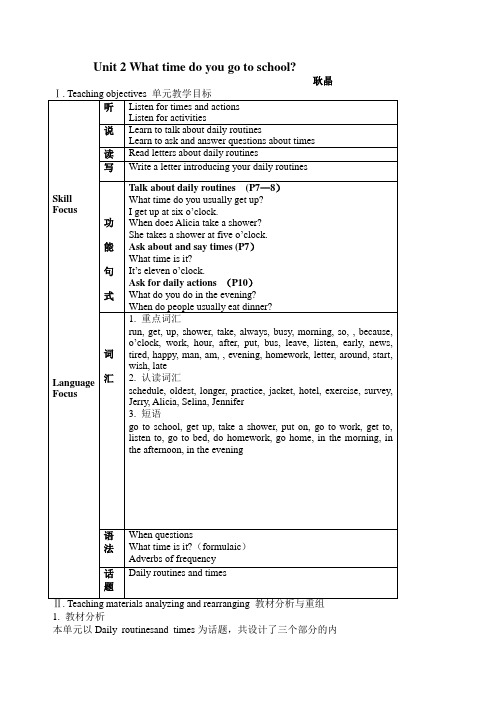
Unit 2 What time do you go to school?耿晶1. 教材分析本单元以Daily routinesand times为话题,共设计了三个部分的内容。
旨在通过单元教学使学生学会谈论日常行为、询问并答复有关时间的问题、询问并回答人们在特定时间所从事的活动。
Section A 学习谈论日常作息时间。
1a, 1b, 1c 重点学习和学生息息相关的几种日常行为的英文表示方法,学会询问和答复日常作息时间。
2a, 2b, 2c ,2d继续学习谈论自己或他人的日常作息时间。
重点学习如何询问,这也是本单元的语法重点。
3a, 3b, 3c 学会叙述他人的日常活动安排,同时学习询问时间和时间表达法,进一步巩固询问别人的日常作息时间的表达法。
Section B 继续学习询问和谈论别人的日常行为。
1a, 1b, 2a, 1c,1d,1e,学会谈论和询问一天内各个时间段的活动安排。
2a,2b,3a,3b学会通过两个人的对比介绍来判断并养成好的作息时间。
Self check 重点单词句型复习2. 课型设计与课时分配Period 1 Listening and speaking (I)(Section A: 1a, 1b, 1c)Period 2 Listening and speaking (II)(Section A:2a, 2b, 2c,2d)Period 3 Integrating skills(Section A:3a, 3b, 3cSection B: 1a, 1b,1c,1d,1e)Period 4 Reading and writing(Section B:2a, 2b, 2c,3a,3b)Period 5 Self checkⅢ. Teaching plans for each periodPeriod 1 Listening and speaking(Ⅰ) Target language目标语言1. Words && phrases生词和短语Up,get up,dress,get dressed,brush,tooth,shower,take a shower,usually,forty, what time,2. Key sentences重点句子When do people usually ...? People usually ...What time do you usually ...? I usually ...Ability goals能力目标Enable students to learn to talk about daily routines.Learning ability goals学能目标Help the students learn how to talk about daily routines.Teaching important / difficult points教学重难点How to talk about daily routines.Teaching aids教具准备A tape recorder and a model clock.Teaching procedures and ways教学过程与方式Step ⅠWarming upIn this procedure, motivate students to learn some words and phrases by singing the songs they’ve learned before.T: Good morning, everyone. (sing) “Good morning to you. Good morning to you. Good morning, dear children. Good morning to you.” This song is easy to learn. Who can sing it to us?Encourage students to sing the song.T: Well done. Thank you! We sing “Good morning to you” in the morning. Then what do we sing in the afternoon and in the evening? S: We sing Good afternoon to you in the afternoon and Good evening to you in the evening.T: That’s right. I know all of you are very good at singing. Does anyone want to sing Good afternoon to you or Good evening to you to us?Step ⅡTalking and reading (1a)In this procedure, ask students to finish the required task and learn some key phrases about daily actions.T: As we all know, time is very important and in English there is a famous saying "An hour in the morning is worth two in the evening." So what do you do in the morning?S1: I read English. S2: I do morning exercise.T: And what do you do in the afternoon and in the evening?S1: I play basketball in the afternoon. S2: I watch TV in the evening.T: I’m very glad to hear that. You use your time very well. And there’re many daily things we can do. Now let’s read these phrases in 1a and match these actions and the time of day.Step ⅢPracticeIn this procedure, students will learn how to talk about actions and the time of day.T: I know you’re very clever. Now I want you to tell if my statements are right or wrong. First, I usually eat dinner in the morning. S: Wrong.T: When do I usually eat dinner? S: In the evening.T: Second, she gets up at 19:00 in the morning. S: Wrong.T: What is the correct way of saying the sentence? S: She gets up at 7:00 in the morning.T: How clever you are! Now let’s read the conversation in groups and see which group reads better.Ask students to do pairwork.T: Please ask your partner when people usually do these things: do homework, eat dinner, eat breakfast and go to bed.(Write “When do people usually ...”on the blackboard)Sample dialogue:S1: When do people usually do homework?S2: People usually do homework in the afternoon.Interest the students in going on practicing the conversation using a new way of reading.T: Now let’s try a new way of reading. First I name one student to ask a question, and then ask all of you repeat this question together. After that, I name another student to answer this question, and all of you repeat the answer together.Sample dialogue:S1: When do people usually go to bed?S: When do people usually go to bed?S2: People usually go to bed in the evening.S: People usually go to bed in the evening.Step ⅣTalking about time (1c)In this procedure, students will learn how to ask about and say hour times and learn some key phrases about daily routines.T: Boys and girls, please listen to what I’m saying and guess what it is. 小小骏马不停蹄,日日夜夜不休息,蹄声哒哒似战鼓,提醒人们争朝夕。
2014人教版七年级英语下册Unit_2_What_time_do_you_go_to_school知识点总结

Unit 2 What time do you go to school?一、知识点总结()1.--What's the time? --______one-thirty.A. ItsB.It'sC.This isD.They're()2.--______ do you usually go to bed?--At six.A. What timeB.How timeC.WhenD.A and C()3. When ______ Tom take a shower?A. doesB. doC. has4. Alicia takes a shower at 9:00.(提问划线部分)______________________________________?5. She often runs in the morning.(对划线部分提问) ________ _________ she often_________?()6. 8:30 am means (意思是)___________.A. half past eight in the morningB. half to eight in the morningC. half past eight in the afternoon7. What time ______ he usually ______(go) to bed?1,What time/when do you get up?What time/when +助动词do/does +主语+动词原形,询问某人做某事的具体时间。
what time do you begin class in the morning?注:What’s the time=What time is it?也是用来询问时间,意为“几点了”。
用it作答。
What’s the time? It’s 7:30.(顺读法、逆读法)()1. Zhang Min usually gets up _______.A. at six thirtyB.at thirty sixC.on six thirtyD.on thirty six()2. -----What time is it ?------It’s ______ 7:00. We often have breakfast ____7:00A. at, atB. /, atC. at, /2.I usually get up at five o'clock.on,at,in这三个常用介词都可以表示时间和地点,但具体用法不同.①on用在日期、星期几、节日前,也表示在具体某一天及具体某一天的上午、下午和晚上。
初一下_unit_2__What_time_dou_you_go_to_school_____Section_B_...
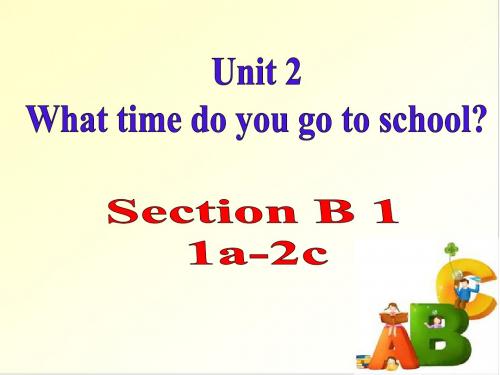
In the evening does her homework, swims or takes a walk At nine thirty
2c Write down the unhealthy habits of each person. Then think of healthy activities for them.
1c Listen and circle the activities
quickly adv. 很快地 either adv. 或者;也(用在否定 词组后) either…or… 要么……要么……; 或者……或者…… lot pron. 大量;许多 lots of 大量;许多
sometimes adv. 有时;间或 taste v. 有……的味道;品尝 n. 味道;滋味 life n. (pl. lives)生活;生命
half
half past nine quarter a quarter to twelve
a quarter past seven A.M. in the morning
P.M. in the afternoon
do homework
go to bed
run
walk
take a walk
clean the room
1) be good for …表示“对……有益;
对……有好处”; be bad for…表示“对……有害; 对……有坏处”。
2) taste 意为“尝起来……”。是连系动 词,后面常跟形容词作表语。学法p13 苹果尝起来味道很好。 Apples taste good. 冰淇淋的味道尝起来很好吗?
Read 2b again and fill in the blanks.
七下Unit_2B_what_time_do_you_go_to_school

B. at
C. on
( B) 2. You run at six_____ the morning.
A. at
B. in
C. on
( C) 3. He can do _____ homework by himself.
A. her
B. him
C. his
( A) 4. Don’t speak! Listen _____ the teacher. A. to B. in C. at
...
B:
get up
6:00
I
take a shower
at …
eat breakfast …
How to tell the time in English?
9:10 10:15 11:20 12:30 13:40 14:45 15:56 nine ten/ ten past nine ten fifteen/a quarter past ten eleven twenty/twenty past eleven twelve thirty/half past twelve one forty pm./twenty to two two forty-five/a quarter to three pm. three fifty-six pm./ four to four pm.
_________ at nine thirty. My life isn’t exciting. go to bed
翻译:
1. 谢谢你的帮助。
Thanks for your help. /Thank you for your help.
Can you tell me about your teacher?
七年级英语下册Unit-2-What-time-do-you-go-to-school教案
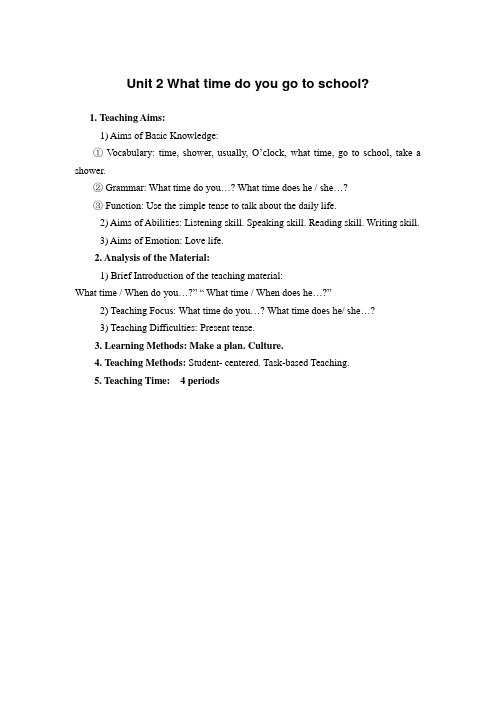
Unit 2 What time do you go to school?1. Teaching Aims:1) Aims of Basic Knowledge:①V ocabulary: time, shower, usually, O‟clock, what time, go to school, take a shower.②Grammar: What time do you…? What time does he / she…?③ Function: Use the simple tense to talk about the daily life.2) Aims of Abilities: Listening skill. Speaking skill. Reading skill. Writing skill.3) Aims of Emotion: Love life.2. Analysis of the Material:1) Brief Introduction of the teaching material:What time / When do you…?” “ What time / When does he…?”2) Teaching Focus: What time do you…? What time does he/ she…?3) Teaching Difficulties: Present tense.3. Learning Methods: Make a plan. Culture.4. Teaching Methods: Student- centered. Task-based Teaching.5. Teaching Time: 4 periodsPeriod 1(Section A: 1a-2a)授课人:______ 授课班级: _____ 授课时间:2014年___月___日____午第____节Step One: Warming-upGreetingT: Good afternoon, everyone.Ss: Good afternoon, Miss Yang.Step Two: Presentation1.Adjust the time, and ask students questions.T: What time is it? Ss: It‟s 12 o‟clock. ( Write on Bb )( Help Ss to say )T: What time is it? Ss: It‟s 10:15.( Help Ss to say )2.Ask one student to come to the front, adjust the time and ask the otherstudents.S1: What time is it? Ss: It‟s 9 o‟clock.3.Teach the new words & phrases.Show some pictures of different clocks and the activities.T: I‟m very busy these days. Can you guess what time I get up / eat breakfast / go to school / run / take a shower? ( Write on Bb)T: I usually get up at 6:35. ( Teach Ss the new word “ usually” )S1: You usually eat breakfast at …S2: You usually run at…S3: You usually take a shower at …4.Ask Ss to do the exercise of 1a, and then check the answers.Step Three: Listening1.Show Ss the timetable of Rick‟s ( write on small Bb )Ask Ss listen to the recorder and fill in the chart.Then check the answers.2.Ask and answer.T: What time does Rick get up / eat breakfast / run / go to school / take a shower ?Ss: He gets up / eats breakfast / runs / goes to school / takes a shower at…( Ask Ss pay attention to the underlined phrases.)Step Four: Consolidation1.Ask Ss to look at the pictures and tell their days.Example: I usually get up at …. I eat breakfast at …. I go to s chool at …. At …, I takea shower.Step Six: Homework1.Try to remember all the words & phrases.2.Survey: Ask your classmates their routines, and give your report.3.Plan: January 1st is coming. Please plan it, and make your day wonderful.Step Seven Blackboard DesignReflection after class:_____________________________________________________________________ _____________________________________________________________________ _____________________________________________________________________ _______________________Period 2 (Section A: 2b-Grammar Focus)授课人:______ 授课班级: _____ 授课时间:2014年___月___日____午第____节1. Aims and demands :1) Language skills :Ss learn to talk about kinds of transportation, and how long it takes to go places, and how far apart places are.2) Target Language : Words : how far , get to , bicycle , subway , bus stop, train station , minute, kilometer, mile , transportation , calendarSentences: How do you get to school ? / How long does it take ? / How far is it ? 3) Moral object : Through learning this unit , Ss can enable them to care for each other whenever crossing the roads and pay attention to the sign of traffic.2. Analysis of the material:Students have learned the transportation before.. In this unit ,they need to learn more details about the transportation. At the same time ,they need to learn “How long and How far” and they can use them freely.3. Teaching methods:pairwork , groupwork ,listening and speaking, practicing4, learning strategies:Personalizing Inferring vocabulary5.Teaching aids:Tape recorder, a projector or a computer6.Teaching period:Four periods.Period 3 (Section B: 3a-3c)授课人:______ 授课班级: _____ 授课时间:2014年___月___日____午第____节1. Aims and Demands: Key vocabulary, How do you get to school ? How does he getto school ?2. Teaching methods : Listening Writing Pairwork3. Teaching Aids : A tape recorder.Step I Leading inT: Good morning, everyone! You know I live far away ,so I go to school by bus every day. What about you? David, “How often do you go to school?”S:--------T: So we will talk about how to get to places in this unit.Step IINow I will show you pic tures and let‟s review the transportations we know. Then we will learn more about it .(take the subway) Please open your books and finish 1a. Step III1. There are five names in 1b.Now they are in the picture. We should find them.2. Play the tape .They should listen carefully and find the persons .Write the numbers next to the correct students in the picture above. After listening , check the answers together .Step IVPoint to the example in the box , ask two students to read it .then ask them to make up their conversations about how the people in the picture get to school .Teacher choose some pairs to act their conversations.Step VPracticing the listening :T: I will play two conversations The people are talking about how students get to school and how long it takes .The first time check the kinds of transportation that you hear. The second time match the time with the kinds of transportation activity 2a.Step VI1. Pay attention to the picture and dialogue.2. Make your own dialogue into pairs.3. Act it in front of the students.Step VIISummary and homework: This class we have learnt some key vocabulary and the target language .I hope after class you can survey how does your friends get to school .and pre-revise the 3a,3b.Step VIII Blackboard DesignReflection after class:_____________________________________________________________________ _____________________________________________________________________ _____________________________________________________________________ __________________________________Period 4授课人:______ 授课班级: _____ 授课时间:2014年___月___日____午第____节。
人教版七年级英语下册Unit_2_What_time_do_you_go_to_school试题及重点知识

Unit 2 What time do you go to school? 单元大归纳短语归纳what time 几点go to school 去上学get up 起床take a shower 洗淋浴take a walk 散步brush teeth 刷牙get to 到达do homework 做家庭作业eat breakfast 吃早饭go to work 去上班go home 回家get home 到家either…or… 要么…要么… at night 在晚上get dressed 穿上衣服in the morning/ afternoon/ evening 在上午/下午/晚上be late for 迟到go to bed 上床睡觉lots of 许多,大量radio station 广播电台用法集萃at + 具体时间点在几点(几分)eat breakfast/ lunch/dinner吃早饭/午饭/晚饭from …to …从……到……thirty\half past +基数词……点半fifteen\a quarter to +基数词差一刻到……点need to do sth 需要做某事典句必背1. What time do you usually get up? I usually get up at six thirty.2. That’s a funny time for breakfast.3. When do students usually eat di nner?4. In the evening, I either watch TV or play computer games.5. At twelve, she eats lots of fruit and vegetables for lunch..6. She knows it’s not good for her, but it tastes good.7. Here are your clothes.unit2 巩固练习Ⅰ. 用适当的词填空,补全下面的短文。
七年级英语下册Unit-2-What-time-do-you-go-to-school知识点总结

Unit 2 What time do you go to school?一、重点词汇〔1〕重点单词和短语get up起床get dressed穿衣服brush teeth/ brush one’s teeth刷牙eat/have breakfast吃早餐run跑步take a shower洗澡;沐浴go to work去工作at a radio station在广播电台radio show广播节目go to school去上学get to school到达学校have English class上英语课have Music class上音乐课play the guitar弹吉他play basketball打篮球play sports做运动eat/have lunch吃午餐after school放学后after class下课后go home回家eat/have dinner吃晚餐take a walk去散步do one’s homework做某人的家庭作业clean one’s room打扫某人的房间go to bed上床睡觉got to bed early/late睡的早/晚on weekends在周末on weekdays在工作日on school days在学校上课日best friend好朋友/最好的朋友eat ice-cream吃冰淇淋eat vegetables吃蔬菜play computer games玩电脑游戏eat a nice/good breakfast吃一份不错的早餐fruits and vegetables水果和蔬菜(2)about 表示“大约〞E.g. She always exercises about seven ten.It’s about 5 kilometers from my home to the school.(3)from...to... “从....到...〞E.g. She works from nine a.m. to five p.m. everyday.〔4〕介词for表示“为了...;对于...〞for breakfast/ lunch/ dinnerE.g. I sometimes eat chicken and rice for lunch.Mike eats fruits and vegetables for dinner.〔5〕after 表动作时间的先后,表示“在...之后〞after school/class/lunch/dinner before 表示“在...之前〞before breakfast/ lunch/ dinnerE.g. I often play sports before breakfast.Mr. Li usually takes a walk after dinner.〔6〕much;many;lots of/ a lot of都表示“许多〞;区分:much+不可数名词;many+可数名词复数;lots of/ a lot of+可数名词复数/不可数名词E.g. I don’t have much time for breakfast. = I don’t have lots of/ a lot of time for breakfast. (time时间为不可数名词)Linda bought many new pens. = Linda bought lots of/ a lot of new pens. (pen为可数名词)〔7〕either A or B 表示“要么A要么B〞,做主语时,根据就近原那么来选择动词形式。
七年级Unit_2_What_time_do_you_go_to_school知识点
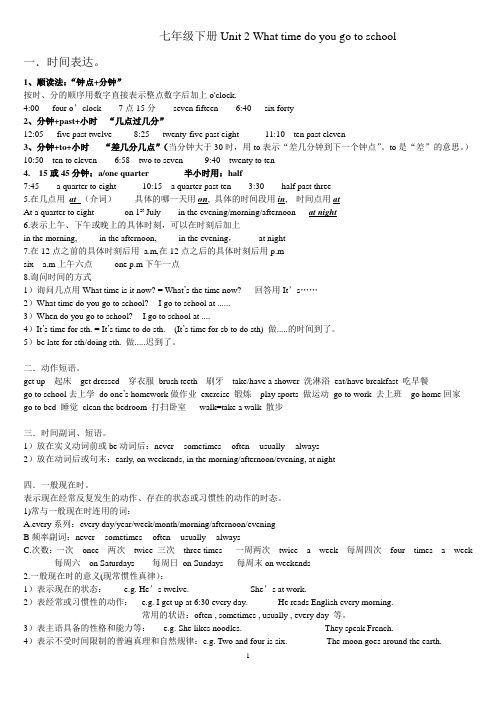
七年级下册Unit 2 What time do you go to school一.时间表达。
1、顺读法:“钟点+分钟”按时、分的顺序用数字直接表示整点数字后加上o'clock.4:00 four o’clock 7点15分seven fifteen 6:40 six forty2、分钟+past+小时“几点过几分”12:05 five past twelve 8:25 twenty-five past eight 11:10 ten past eleven3、分钟+to+小时“差几分几点”(当分钟大于30时,用to表示“差几分钟到下一个钟点”。
to是“差”的意思。
)10:50 ten to eleven 6:58 two to seven 9:40 twenty to ten4. 15或45分钟:a/one quarter 半小时用:half7:45 a quarter to eight 10:15 a quarter past ten 3:30 half past three5.在几点用at (介词)-- 具体的哪一天用on, 具体的时间段用in, 时间点用atAt a quarter to eight on 1st July in the evening/morning/afternoon at night6.表示上午、下午或晚上的具体时刻,可以在时刻后加上in the morning, in the afternoon, in the evening,at night7.在12点之前的具体时刻后用a.m,在12点之后的具体时刻后用p.msix a.m上午六点one p.m下午一点8.询问时间的方式1)询问几点用What time is it now? = What’s the time now? 回答用It’s……2)What time do you go to school? -- I go to school at ......3)When do you go to school? -- I go to school at ....4)It’s time for sth. = It’s time to do sth. (It’s time for sb to do sth) 做.....的时间到了。
人教版七年级英语下册unit2_what_time_do_you_go_to_school_课件
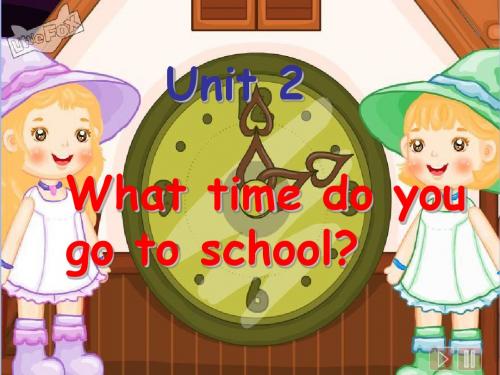
Section B
When do people usually eat breakfast? They usually eat breakfast in the morning. When do people usually do homework? They usually do homework in the afternoon. When do people usually eat dinner? They usually eat dinner in the evening. When do people usually go to bed? They usually go to bed in the evening.
go home
do homework
watch TV
take a shower
go to bed
get up eat breakfast take a bus go to school have a class have lunch ; play sports go home have dinner do homework watch TV take a shower go to bed
Report: Jim gets up at 6 o’clock. He eats breakfast at 7:30. …
Survey: the time to get up
name
Jim Mary Tom
time
5:00 5:30 6:00
……
……
Report: Jim gets up at five o’clock. Mary gets up at five thirty. Tom gets up at six o’clock. … XX gets up earliest.
新人教七下Unit_2A__What_time_do_you_go_to_school

What time is it? It is ---. It is twelve (o’clock). 2:15 8:30 10:55 It is two fifteen. It is eight thirty. It is ten fifty-five.
1:00
2:00 4:00 7:00 5:00
take a shower
go to school
8:00
9:00
知 识 拓 展
1. Time is life. 时间就是生命。 2. Every second counts. 分秒必争。 3. All time is no time when it is past.
光阴一去不复返。
4. Time isቤተ መጻሕፍቲ ባይዱmoney.
从不,绝不
早的;早 工作; 职业 工作 车站
自 学 (1)
有趣的,好笑的,滑稽的
锻炼 最好的 小组
测试
从不;绝不 早;早的 工作;职业 工作 车站 滑稽的 锻炼 最好的 小组
never early
job work station funny exercise best group
get up get dressed A: What time do you usually…? brush teeth eat breakfast go to school
6:00
I
run
at
six
o’clock.
6:30
I brush teeth at six thirty
7:00
I take a shower at seven o’clock.
8:00
I eat breakfast at eight o’clock.
七年级下册unit2-What-time-do-you-go-to-school-知识点讲解与练习
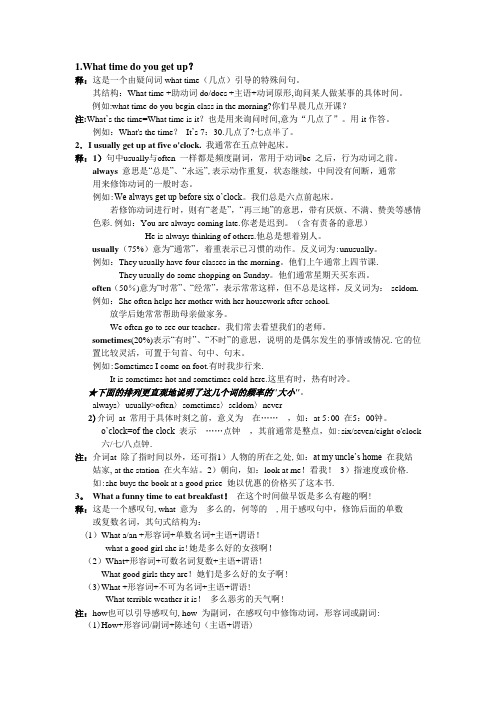
1.What time do you get up?释:这是一个由疑问词what time(几点)引导的特殊问句。
其结构:What time +助动词do/does +主语+动词原形,询问某人做某事的具体时间。
例如:what time do you begin class in the morning?你们早晨几点开课?注:What’s the time=What time is it?也是用来询问时间,意为“几点了”。
用it作答。
例如:What's the time?It’s 7:30.几点了?七点半了。
2.I usually get up at five o'clock. 我通常在五点钟起床。
释:1)句中usually与often 一样都是频度副词,常用于动词be 之后,行为动词之前。
always意思是“总是”、“永远”,表示动作重复,状态继续,中间没有间断,通常用来修饰动词的一般时态。
例如:We always get up before six o’clock。
我们总是六点前起床。
若修饰动词进行时,则有“老是”,“再三地”的意思,带有厌烦、不满、赞美等感情色彩.例如:You are always coming late.你老是迟到。
(含有责备的意思)He is always thinking of others.他总是想着别人。
usually(75%)意为“通常”,着重表示已习惯的动作。
反义词为:unusually。
例如:They usually have four classes in the morning。
他们上午通常上四节课.They usually do some shopping on Sunday。
他们通常星期天买东西。
often(50%)意为“时常”、“经常”,表示常常这样,但不总是这样,反义词为:seldom.例如:She often helps her mother with her housework after school.放学后她常常帮助母亲做家务。
七年级英语-what_time_do_you_go_to_school教案3(七年级英语)AUHMAK

Unit 2 What time do you go to school?Section B课堂学习【知识精讲】1. When do people usually eat dinner? 人们通常什么时间吃晚饭?这是when引导的特殊疑问句。
when是疑问副词,意为“什么时候”。
对时间进行提问,提问的对象可以是较长的时间段。
如:--When is your birthday? 你的生日是什么时候?--It’s April 9th. 四月九号。
2. People usually eat dinner in the evening. 人们通常在晚上吃正餐。
eat dinner也可以说成have dinner。
in the evening意为“在晚上”。
【拓展】介词at, in, on表时间的区别:1) at用在时刻前,表示几点几分,也可以用来表示在正午,在夜晚。
如:at three 在三点at noon 在正午at night 在晚上2) in用在年份、季节、月份、星期前,也可以表示一天中的一段时间。
如:in the morning/afternoon/evening 在上午(中午、晚上)in winter 在冬天in September 在九月3) on用在日期、星期几和节日前,也可以用来表示具体某天或某天的早上、下午、晚上等。
如:on January 5th 在一月五号on Sunday afternoon 在星期天下午【例题解析】_______ March 28, about 20 Chinese cities turned off lights of major buildings for one hour.A. AtB. InC. OnD. Of【解析】C 在具体的某一天“3月28日”前用on。
课后提高【夯实基础】I. 用英语写出下列时间。
1. 3:12 __________2. 4:30 __________3. 8:10 __________4. 6:20 ___________5. 5: 27 _________6. 9:09 ___________7. 7: 19 __________ 8. 3:20 ___________9. 10:11 __________ 10. 4:15__________II. 翻译词组。
2012【新】人教版新目标七年级下英语Unit_2_What_time_do_you_go_to_school__练习题含答案
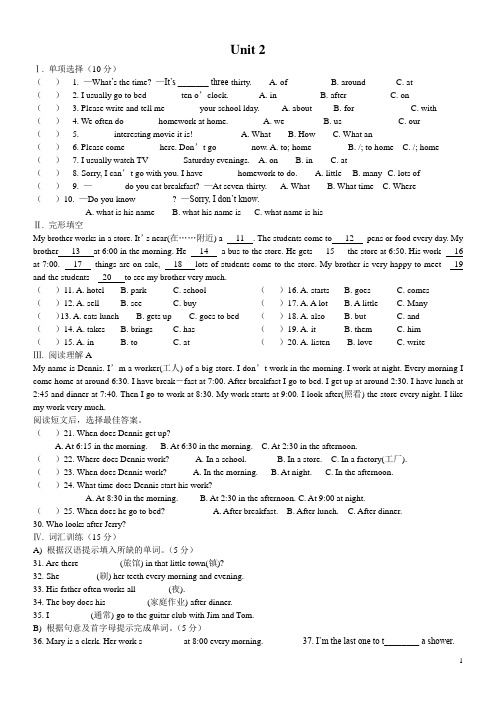
Unit 2Ⅰ. 单项选择(10分)() 1. —What’s the time? —It’s _______ three-thirty. A. of B. around C. at() 2. I usually go to bed _______ ten o’clock. A. in B. after C. on() 3. Please write and tell me _______ your school lday. A. about B. for C. with() 4. We often do _______ homework at home. A. we B. us C. our() 5. _______ interesting movie it is! A. What B. How C. What an() 6. Please come _______ here. Don’t go _______ now. A. to; home B. /; to home C. /; home()7. I usually watch TV _______ Saturday evenings. A. on B. in C. at()8. Sorry, I can’t go with you. I have _______ homework to do. A. little B. many C. lots of()9. —_______ do you eat breakfast? —At seven-thirty. A. What B. What time C. Where()10. —Do you know ________? —Sorry, I don’t know.A. what is his nameB. what his name isC. what name is hisⅡ. 完形填空My brother works in a store. It’s near(在……附近) a 11 . The students come to 12 pens or food every day. My brother 13 at 6:00 in the morning. He 14 a bus to the store. He gets 15 the store at 6:50. His work 16 at 7:00. 17 things are on sale, 18 lots of students come to the store. My brother is very happy to meet 19 and the students 20 to see my brother very much.()11. A. hotel B. park C. school()12. A. sell B. see C. buy()13. A. eats lunch B. gets up C. goes to bed ()14. A. takes B. brings C. has()15. A. in B. to C. at ()16. A. starts B. goes C. comes ()17. A. A lot B. A little C. Many ()18. A. also B. but C. and ()19. A. it B. them C. him ()20. A. listen B. love C. writeⅢ. 阅读理解AMy name is Dennis. I’m a worker(工人) of a big store. I don’t work in the morning. I work at night. Every morning I come home at around 6:30. I have break-fast at 7:00. After breakfast I go to bed. I get up at around 2:30. I have lunch at 2:45 and dinner at 7:40. Then I go to work at 8:30. My work starts at 9:00. I look after(照看) the store every night. I like my work very much.阅读短文后,选择最佳答案。
七年级-新目标下Unit-2-What-time-do-you-go-to-school-复习课件
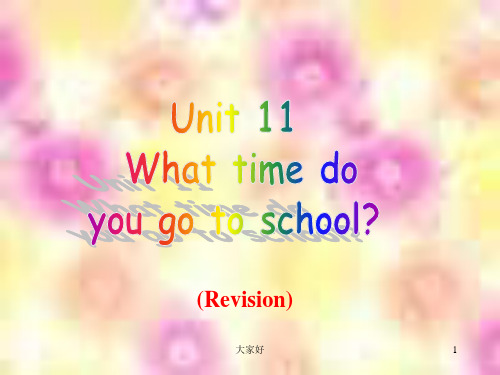
It is nine o’clock. Mr. Sawyer usually reads his newspaper at night. But he’s not reading his newspaper tonight. At the moment, he’s reading an interesting book.
她通常几点洗澡?
What time does she take a shower?
他在晚上9点洗澡。
He takes a shower at 9 o’clock in the evening.
我在早上喜欢多睡一会儿觉。
I like to sleep a little longer in the morning.
• When ×do Rick usually get up?(×)
• School starts at nine o’clock.(√ ) • Do you wanttoknow about my morning?(×) 1. People usually watch TV intheevening.(×)
It is four o’clock. Mrs. Sawyer usually stays at home in the morning, but this morning, she is going to the shops.
It is four o’clock. In the afternoon. Mrs.
在晚上 in the evening
吃早餐 eat/have breakfast
洗澡 take a shower 吃晚餐 eat dinner
回家 go home
去睡觉 go to bed
新版新目标七下Unit_2_What_time_do_you_go_to_school知识点及习题

Unit 2 What time do you usually go to school?一、重点词汇(1)起床__________(2)去上学__________(3)去工作__________(4)穿衣服__________(5)刷牙__________(6)吃早餐__________(7)吃午餐__________(8)吃晚餐__________(9)洗澡;沐浴__________(10)去散步__________(11)几点钟__________(12)在6:30__________(13)半小时__________(14)一刻钟__________(16)一个小时__________(17)起床早_________(18)有一份有趣的工作__________ (19)广播电台__________(20)从……到……__________ (22)在早餐/午餐/晚餐时间______ (23)那之后__________(24)放学后__________(25)下课后__________(26)快速地吃__________ (27)上课迟到__________(29)(上学迟到__________(31)在周末__________(32)在学校上课日的晚上__________ (33)好朋友/最好的朋友__________ (36)在早上/下午/晚上_______________(38)在星期天(早上)__________ (39)回家__________(40)到家__________(41)做…..家庭作业__________ (42)打扫房间__________(43)上床睡觉__________(44)吃冰淇淋__________(45)吃蔬菜__________(46)做运动_____________(47)许多__________(48)要么……要么……__________ (49)玩电脑游戏__________(50)许多的;大量的___________ (52)水果和蔬菜___________(53)味道不错___________(55)放学回家___________二、必背句子(尝试翻译一下下列句子)1.What time do you usually get up?--- I usually get up at six thirty.2. What time does Rick eat breakfast? --He eats breakfast at seven o’clock.3. What time do they get dressed?-- They always get dressed at seven twenty.4. When do your friends exercise? --They usually exercise on weekends.5. When does Scott go to work? --He always goes to work at eleven o’clock.6. That’s a funny time for breakfast!7. I don’t have much time for breakfast, so I usually eat very quickly.8.I sometimes play basketball for half an hour.9. In the evening, I either watch TV or play computer games.10. After that, she goes to school at eight thirty.11 At twelve, she eats lots of fruit and vegetables for lunch.12. She knows it’s not good for her, but it tastes good.三、按要求改写句子.1. Alicia takes a shower at 9:00.(提问划线部分提问)__________________________2. Mary takes a shower at 8:00.(变一般疑问句) ________ Mary ________ a shower at 8:00?3. I usually go to bed at 10:00.(变否定句)I _______ usually _______to bed at 10:00.4. She often runs in the morning.(对划线部分提问)________ _________ she often _________?5. I usually get up at five o’clock every day. (对划线部分提问)________ _________ ________ you get up every day?四、单选题1. —What time is it ? —It’s ___ 7:00. We often have breakfast ____7:00A. at, atB. /, atC. at, /2. —My parents ask me to finish my homework _____ after school. —It's a good habit.A.one B.first C.ones D.once3. That’s a funny time ______ breakfast! A. for B. in C. on4. Scott has _____ interesting job. A. an B. a C. /5. I go to _____ work after _____ breakfast every day. A. /, the B. /, / C. the, /6. What time does Linda _______ after school?A. do her homeworkB. does her homeworkC. do her homeworks7. When do you _______ every day? A. go to home B. go home C. go a home8 Ice-cream is not good for us, but it tastes _______.A. well B. good C. bad9. —Either you or she ________ on duty today, don't forget it. —OK, I won't.A.is B.am C.are D.be10. You can either take a bus ______ go there on foot. A. and B. or C. but五、根据汉语意思完成下列句子,每空一词。
- 1、下载文档前请自行甄别文档内容的完整性,平台不提供额外的编辑、内容补充、找答案等附加服务。
- 2、"仅部分预览"的文档,不可在线预览部分如存在完整性等问题,可反馈申请退款(可完整预览的文档不适用该条件!)。
- 3、如文档侵犯您的权益,请联系客服反馈,我们会尽快为您处理(人工客服工作时间:9:00-18:30)。
Unit 2 What time do you go to school?I. 单项选择(每小题1分,共15分) 从下列各题所给的A、B、C、D四个选项中,选择可以填入空白处的最佳选项。
( )1. —____ do you eat dinner on weekends?—At home. I usually have it with my family at 7:00 pm.A. WhenB. WhatC. WhoD. Where( )2. —What do you do on Sunday afternoons? —I ______ watch TV.A. usuallyB. soonC. thenD. around( )3. Li Ping watches TV for __________ hour every day. A. a B. an C. the D. / ( )4. I want to go to the Grand Hotel but I’m los t. Where can I ______ a bus?A. buyB. sellC. takeD. bring( )5. ______ funny time to play table tennis!A. What B. How C. How a D. What a ( )6. Do you know what his job ______? A. does B. be C. do D. is( )7. —What do your parents _______ do after dinner? —They take a walk.A. likeB. help toC. loveD. love to( )8. —______? —It’s three o’clock.A. What time is itB. What day is itC. How much is itD. When do you usually get up ( )9. —What’s her ______? —She is a teacher. She has a lot of _____ to do.A. work; workB. job; jobC. work ; jobD. job; work( )10. Jim often _____ school at 8:00 and _____ home at 17:00.A. gets; getsB. gets to; gets toC. gets; gets toD. gets to; gets( )11. Monica, please _______ me how to spell "weekend". A. show B. think C. tell D. speak( )12. My brother often goes to school ______ 7:00 ______ the morning.A. at; inB. in; atC. at; onD. in; on( )13. ______ you a very good time here. A. Wish B. Want C. Like D. Teach( )14. My good friend, Mary is in America. I often write to ______.A. me B. her C. them D. you ( )15. —How can I go to your school? —______.A. You can walk there with meB. You can take the red sweaterC. You can afford itD. You can buy it for fifty yuan eachII. 完形填空(每小题1分,共10分) 阅读下面的短文,掌握其大意,然后从短文后各题所给的A、B、C、D四个选项中,选择最佳选项。
Today is Monday (周一). We have a(n) 36 class in the morning. It 37 at 8:30, but I am late (迟到的) for it. I often 38 school at about 7:50, 39 today I get there late. At about nine o’clock I get to the classroom. I’m really 40 . My English teacher, Miss Green is very kind to me. She 41 me in and doesn’t criticize (批评) me. How nice she is!All the students 42 my class like Miss Green. I have many subjects at 43 : math, English, P.E., music, 44 and computer, but I like English 45 . I like my English teacher and I like her classes. I’ll never (不再) get to school late. I’ll get up very early (早) in the morning.( )16. A. math B. art C. music D. English( )17. A. goes B. starts C. shows D. works( )18. A. learn about B. look at C. get to D. work in( )19. A. or B. and C. after D. but( )20. A. sorry B. exciting C. good D. happy( )21. A. likes B. meets C. lets D. joins( )22. A. on B. in C. for D. about( )23. A. store B. home C. school D. party( )24. A. Chinese B. letter C. festival D. action( )25. A. little B. best C. too D. wellIII. 阅读理解(每小题2分,共20分)What time do you wake up, Alex? I wake up at six o’clock.Activity wake up(醒来) get up brush teeth take a showerTime 6:00 6:35 6:40 6:45Activity have breakfast go to school finish (结束) school have lunchTime 7:00 7:15 13:00 13:30Activity do homework have dinner go to bedTime 15:20 19:00 21:30根据图表内容补全下列句子。
26. This is ______’s daily routine (日常生活).27. He gets up at 6:35 am and ______ ______ at 7:00 am.28. He always brushes his teeth at ______ and takes a shower at ______.29. He has ______ classes after 1:00 pm.30. He does his homework in the _____________.In my family, there are my parents, my grandparents, my brother and I. We are a happy family. My father is a teacher. He works in a school. He gets up early and works very hard every day. Sometimes he helps me with my homework. His students love him very much because he likes to help them. My mother is a writer. She doesn’t need to go to work but she writes books, cleans (打扫) the house and takes care of (照顾) us. My grandparents are old. They don’t have jobs. They stay at home every day, reading newspapers (读报) and watching TV. They go to bed early. My brother is a student. He is in my school, too. He likes playing basketball, tennis and ping-pong. I like to play soccer, ping-pong and computer games. After school, we get home early. We do our homework, play sports and help our parents in the evening.( )31. There are ______ people in the family. A. five B. six C. seven D. eight( )32. My brother is a ______. A. writer B. runner C. student D. teacher( )33. My mother works ______.A. in a school B. in a hotel C. in a store D. at home( )34. My grandparents ______.A. help us with our homeworkB. write booksC. don’t have jobsD. don’t like watching TV ( )35. My brother and I both (都) like playing ______.A. basketballB. soccerC. tennisD. ping-pongIV. 词汇运用(每小题1分,共5分) 根据句意及首字母提示,写出所缺单词的适当形式。
